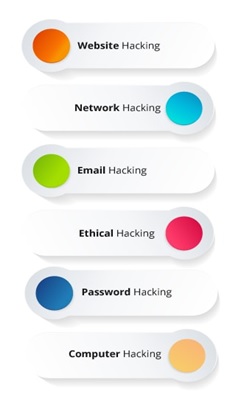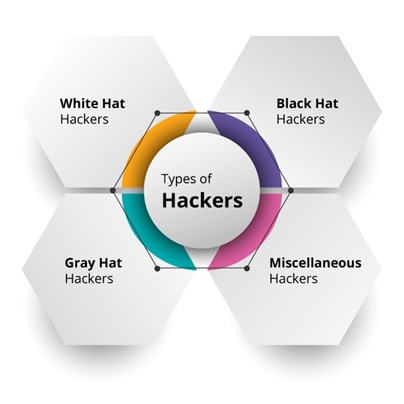Ethical Hacking Tutorial for Beginners
Hacking has been a part of computing for almost five decades and the term “hacker” was originated in 1960 at MIT.
The increased popularity of the internet and eCommerce has helped skilled programmers to find weaknesses or loopholes in the computer system for stealing valuable information or for financial gain.
But not all hacking is bad. This paves the way to the second type of hacking: Ethical hacking.
Ethical Hacking
- Ethical hacking is penetration testing that helps the hackers to find vulnerabilities in a target system and “ Legally “ exploit them.
 Types of Hacking
Types of Hacking
We can define hacking into different categories. These are as follows:
- Website hacking: Taking unauthorized access over a web server, database and make a change in the information is called website hacking.
- Network Hacking: With the intent to harm the network system hackers hack the networks using various tools like NS lookup, Tracert, etc.
- Email hacking: Taking unauthorized access to an email account and using it without the owner’s permission.
- Password hacking: Recovering secret passwords from data that has been already stored in the computer system.
- Computer hacking: Taking unauthorized access to the Computer system and steals information like passwords is computer hacking.
Types of Hackers

White Hat Hackers
- White Hat hackers are Ethical Hackers!
- White hat hackers are usually software engineers who hack for good reasons i.e. they try to find out weaknesses in a computer or a network system as a part of penetration testing and vulnerability assessments without intending to harm the system.
Black Hat Hackers
- Black hat hackers are those who hack to gain unauthorized access to a system to steal the corporate data, violating privacy, damaging the system, blocking network communication, etc
Grey Hat Hackers
- A combination of both black hat and white hat hackers are called grey hat hackers.
- They hack for fun, they exploit a security weakness in a computer system to bring the attention of the owners and getting appreciation from them.
Miscellaneous Hackers
Miscellaneous hackers are based on what they hack and how they do it :
● Red Hat Hackers
● Blue Hat Hackers
● Elite Hackers
● Script Kiddie
● Neophyte
● Hacktivist
Tools Used in Ethical Hacking

NMAP
Nmap is called a Network Mapper. Nmap is an open-source tool that was originally designed to scan large networks. Network administrators also find it useful for tasks such as network discovery, security auditing, managing service upgrade schedules, etc…
Raw IP packets are used by Nmap to determine:
- Which host is available on the network?
- What services hosts are offering?
- Which operating systems they are running on?
- What type of firewalls is in use?
Netsparker
- Netsparker is the only security scanner to automate web security scanning tools. This tool allows ethical hackers to scan websites, web services, and web applications and finds security flaws and vulnerabilities in a read-only safe way.
Metasploit
Metasploit is a product of Rapid7 and this is considered one of the most powerful exploit tools.
With Metasploit, you can perform the following operations −
- Basic penetration tests on small networks
- Spot checks on the vulnerabilities, network architecture, and system infrastructure are secure.
- Discover the network or import scan data
Burp Suite
- Burp Suite is an easy and popular platform that is widely used for performing security testing of web applications that provides the administrators full control to combine advanced manual techniques with automation for efficient testing.
John the Ripper
- It is highly advanced and one of the most popular tools used for cracking passwords.
Ethical Hacking Career Path
Ethical hacking professionals work in big companies and industries to protect organizations from data breaches and attacks. And the demand for Ethical hacking is growing at a breakneck speed.
Ethical hacker skills
Your skills play a vital role in ethical hacking, this is not just science rather it is an art!
One needs to put a lot of effort to keep up-to-date with the latest technologies, new vulnerabilities, and get certified.
- Programming Language: An ethical hacker must be a computer systems expert and needs to have very strong programming and computer networking skills.
List of programming languages to learn :
| Computer Language | Description | Purpose |
| HTML | Used for creating web pages | HTML is a basic mark-up language that is used to enter data all over the internet. Helps to figure out security issues in the code |
| Javascript | Client-side scripting language. Also used for writing backend services | JavaScript code is executed on the client browser and this helps in reading the saved cookies. |
| SQL | Used for interacting with databases | SQL injection is used to by-pass web application login algorithms that are weak. |
| PHP/Ruby | Server-side scripting. | PHP one of the most used web programming languages that modify settings on a web server and makes the server vulnerable to attacks. |
- Operating System: Linux, Windows, & Mac OS.
- Security : Firewalls, cryptography, encryption, decryption, SSL, HHTP, HTTPS, IPsec etc.
- Logical thinking: Think like a Black hat hacker
There is a very obvious skill gap in the ethical hacking industry today, and therefore many high-profile enterprises have been subject to major hacking issues. Owing to the gap between the demand and supply of ethical hackers, the rise in job opportunities has increased, making ethical hacking one of the most demanding careers.
Also read: In the era of AI, how coding is most important for student
















Add comment